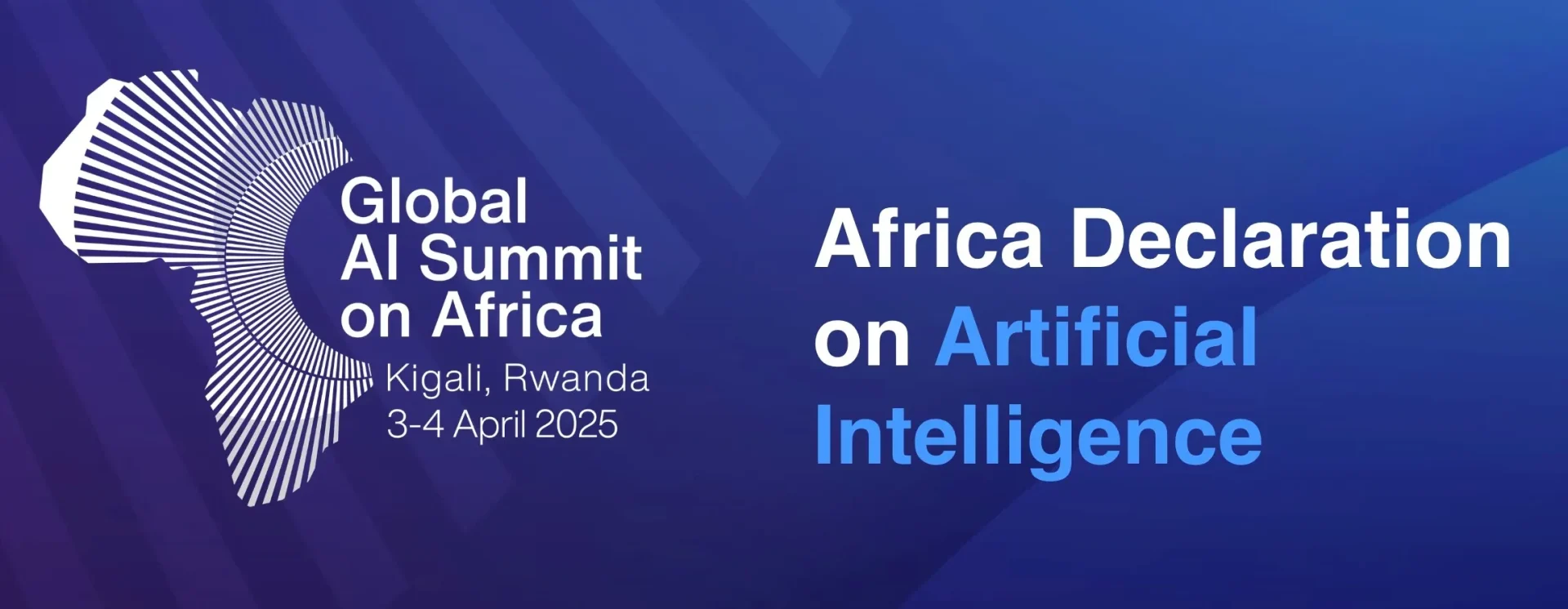The inaugural Global AI Summit on Africa summitted with the announcement of the Africa Declaration on Artificial Intelligence, a pivotal turning point for Africa AI journey.
The declaration seeks:
- To leverage the potential of AI to drive innovation and competitiveness to advance Africa’s economies, industries, and societies.
- To position Africa as a global leader in ethical, trustworthy, and inclusive AI adoption.
- To foster the sustainable and responsible design, development, deployment, use, and governance of AI technologies in Africa.
The Africa Declaration on Artificial Intelligence
1. Preamble
WHEREAS leaders from Africa have gathered in Kigali, Rwanda, on 4th April 2025.
RECOGNIZING the transformative potential of Artificial Intelligence (AI) as outlined, and in alignment with the African Union Continental Strategy on AI, Smart Africa AI for Africa Blueprint, AU Data Policy Framework, AU Convention on Cybersecurity and Personal Data Protection, and the United Nations Global Digital Compact.
HAVING REGARD to the foundational outcomes established at the AI Summits convened in Bletchley Park, Seoul, and Paris.
ACKNOWLEDGING the unique opportunities, risks, and challenges that AI presents for our continent and the exponential pace of development and adoption.
REAFFIRMING our commitment to the African Union’s Agenda 2063 and the United Nations Sustainable Development Goals.
NOW, THEREFORE, we hereby present the following Declaration:
2. Guiding Principles and Objectives
2.1. Guiding Principles
- Sovereignty, inclusivity, and diversity in African AI design and deployment should benefit all African communities and reflect Africa’s strategic priorities, shared values, and diverse cultural contexts.
- Safeguards must be implemented to prevent harm and protect privacy, ethics, transparency, and explainability while prioritizing human dignity, rights, freedoms, and environmental sustainability.
- Regional, global, and public-private collaboration are essential to prioritize and invest in domestic capabilities and infrastructure, ensuring the long-term sustainability and inclusive growth of AI technologies in Africa.
2.2. Objectives
- To leverage the potential of AI to drive innovation and competitiveness to advance Africa’s economies, industries, societies.
- To position Africa as a global leader in ethical, trustworthy, and inclusive AI adoption.
- To foster the sustainable and responsible design, development, deployment, use, and governance of AI technologies in Africa.
3. Key Commitments
3.1. Talent
We shall develop a pipeline of AI practitioners who can meet the needs of the continent by establishing:
- Continent-wide AI education initiatives with curriculum development for youth at all levels.
- Adapted higher learning institution curricula that provide globally competitive AI skills.
- Increased AI research capacity in higher learning institutions by strengthening PhD programs in Africa and scaling research capacity through strategic international partnerships.
- Programs that will inform and empower citizens to be aware of the benefits and risks of AI through AI awareness and AI literacy training.
We endorse the creation of an African AI Scientific Panel, which shall consist of AI experts from Africa and the diaspora, to advocate for contextually relevant, evidence-based research on the risks, opportunities, and socio-economic impact of AI in Africa, providing a knowledge base for policymakers, researchers, and practitioners.
3.2. Data
- We shall establish a framework for African open data sets and open AI models, facilitating the collection, digitization, and interoperability of key datasets in critical sectors, such as healthcare, agriculture, education, and climate resilience and adaptation.
- In compliance with the AU Data Policy Framework, national data protection laws, and global best practices, we shall develop robust data governance mechanisms, ensuring security and privacy through standardized data formats, metadata, exchange protocols, and encryption standards.
- To safeguard African data, we shall incorporate data practices and systems that promote diversity, inclusion, consumer protection, and intellectual property rights that lead to equitable benefits and just outcomes for all.
3.3. Compute Infrastructure
- We shall ensure the deployment of distributed sovereign compute infrastructure supporting all regions of the continent.
- We shall ensure that ecosystem enablers, including academic institutions, research centers, and startups, will have access to affordable high-performance computing (HPC) resources.
- We shall establish regional data centers with HPC connected through a continental high-speed network and build robust cybersecurity measures to safeguard data integrity and resilience, optimizing compute resources with minimal carbon footprint.
3.4. Market
- We shall establish regional AI incubation and scaling hubs that support African-led AI innovation with commercial potential, working with the funding ecosystem to facilitate access to capital.
- We shall adopt an “Africa-first” approach to AI procurement and leverage African Continental Free Trade Area (AfCFTA) to facilitate cross-border scaling of projects, products, and services. This effort will include an African AI innovation sandbox, an AfCTA regulatory sandbox, and AI research centers.
3.5. Investment
- A $60 billion Africa AI Fund will be established, leveraging public, private, and philanthropic capital, to create a safe, inclusive, and competitive African AI economy through foundational and catalytic investment.
- The Fund shall invest in developing and expanding AI infrastructure, scaling African AI enterprises, building a robust pipeline of AI practitioners, and strengthening domestic AI research capabilities, while upholding principles of equity and inclusion.
3.6. Governance
- We shall support adopting innovative and responsible national AI policies and governance frameworks aligned with the African Union AI Continental Strategy.
- To streamline policy and regulatory approaches in Africa, we support establishing a continent-wide knowledge-sharing platform to inform best practices in AI governance, including policy toolkits and AI regulatory sandboxes.
- To enable harmonization with national frameworks, we will promote intergovernmental and regional cooperation, including robust frameworks for cross-border data flows.
3.7. Institutional Cooperation
- We endorse the establishment of the Africa AI Council, under the leadership of the Smart Africa Steering Committee, which is co-chaired by the African Union Commission and the International Telecommunications Union, to ensure high-level engagement and strategic alignment with continental and global digital transformation efforts.
- We recognize the strategic role the Council will play in shaping Africa’s position within the global AI economy by leveraging experts from government, private sector, civil society, and academia.
IN WITNESS WHEREOF, we, the undersigned ministers and officials, duly authorized to that effect, have signed this Declaration.
DONE at Kigali, Rwanda, this fourth day of April two thousand and twenty-five.
Signatories:
| African Union | Smart Africa | Algeria |
| Angola | Benin | Botswana |
| Burkina Faso | Burundi | Cabo Verde |
| Cameroon | Central African Republic | Chad |
| Comoros | Côte d’Ivoire | Djibouti |
| Egypt | Equatorial Guinea | Eritrea |
| Eswatini | Ethiopia | Gabon |
| Gambia | Ghana | Guinea |
| Guinea-Bissau | Kenya | Lesotho |
| Liberia | Libya | Madagascar |
| Malawi | Mali | Mauritania |
| Mauritius | Morocco | Mozambique |
| Namibia | Niger | Nigeria |
| Republic of the Congo | Rwanda | São Tomé and Príncipe |
| Senegal | Seychelles | Sierra Leone |
| Somalia | South Africa | South Sudan |
| Sudan | Togo | Tunisia |
| Uganda | Zambia | Zimbabwe |

